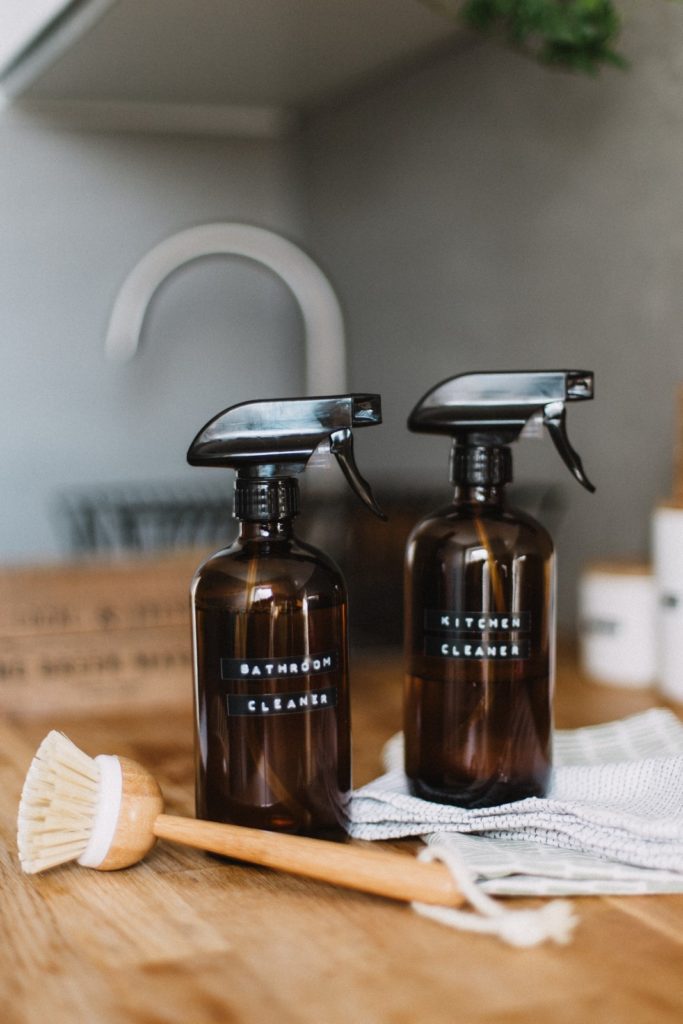by Melanie Peskoe
Cleaning has never been something I enjoy. I’ll just put that out there right now. I would love to be able afford to hire a housekeeper to do the heavy lifting related to cleaning. Sadly, sigh, my budget doesn’t even come close to allowing for that expense! Since I don’t want to live in an utter pigsty, I have no choice but to roll up my sleeves and do the work!
Sure, there are the normal day to day chores that most of us do regularly, like dishes, dusting, vacuuming, laundry. But I’m talking about the big ones – the ones we might do once or twice a year, that is if you’re anything like me! When I consider spring cleaning, or even fall cleaning, I think of washing the curtains and blinds, cleaning baseboards and crown moldings, cleaning the inside of the window casings, light fixtures, and a heavy-duty cleaning of the refrigerator. There is a lot more to spring cleaning, but you get the idea. As someone with low vision, I have figured out a few tips and tricks to accomplish cleaning tasks non-visually and with confidence that they’re done well. I thought I’d share some tips I’ve learned and recipes for homemade cleaners I’ve discovered over the years.
Helpful Tips for Cleaning with Low or No Vision
Windows
A super helpful tip I have found when cleaning windows, inside and out, is to wipe in a Z pattern. I spray the window cleaner (more on that in a minute) on my cleaning cloth, then I start in the upper left-hand corner and work across to the right corner. When I start to go back to the left, I lower my hand just a bit and then move in that direction. Lastly, when I start to come back to the right, I again lower my hand just a bit and continue on. When you’re doing this as one fluid motion, you can cover a lot of ground. Just repeat this moving down the window or mirror. I spray the cleaner on my cloth to ensure I don’t miss cleaner running down the glass.

Baseboards and Other Surfaces
I take off the gloves when cleaning areas like baseboards, crown moldings, light fixtures, and generally anything I likely will not see. I know that no one likes to get their hands dirty, but to get the best result I have to feel the results. So, to make sure I’ve been thorough in my cleaning, I remove my gloves and use my homemade all-purpose cleaner and a clean cloth diaper. Yes, you read right, I use cloth diapers for cleaning. They’re inexpensive, soft enough for a baby’s bottom and they work beautifully! I spray the cloth first; then I use a two-handed technique to clean the surface. I start with my free hand and inspect the area that I’m cleaning. After I “see” (with my hand) where the dirt or dust is, I use a wet cloth in my free hand to wipe down the area that is dirty, while continuing to “mark” the spot with my other hand. After wiping, I check it with my bare hand to make sure it feels clean.
Recipes for Making Homemade Cleaners
I make a few of my own all purpose and glass cleaners at home. They are more economical, and I feel better that I know exactly what ingredients they contain.
Window, Glass, and Mirror Cleaner
- 1 part vinegar
- 10 parts water
- A few drops of your favorite essential oil
Mix everything together in a clean spray bottle and you’re all set! I usually just make about a cup at a time and then I can change the essential oils I use to suit my mood. During the holidays I use pine and during the spring I prefer citrus.
All-Purpose Cleaner
- One part water
- One part vinegar
- ½ teaspoon liquid dish soap
- A few drops of your favorite essential oil
Homemade Disinfectant
I use this recipe in the refrigerator, and on doorknobs and light switches.
- ¼ cup rubbing alcohol
- ¼ cup vinegar
- ¼ cup water
- About 20 drops tea tree oil (count by dripping into a metal cup or bowl and listen for the drops)
Stovetop Cleaner
This recipe is great for stovetops and stainless-steel pots and pans. It’s helpful anywhere you have a pan scorch or baked on food that does not want to come off with plain old soap and water.
- ½ cup baking soda
- ½ teaspoon liquid dish soap
- 2-3 tablespoons water (or more if needed to get a paste consistency)
There you have it–some handy tips and recipes to get started cleaning your home safely and independently. We all want our homes to look and feel clean. But I want to leave you with this thought–at the end of the day, all we can do is try to do our best and trust that it is enough.
Will your end results be spit and polish clean? I don’t know. I’m sure my cleaning isn’t always perfect. I do know that by using the techniques I’ve described and my cleaning solutions, I feel confident about how my home looks when guests arrive! With a little time and elbow grease, your cleaning job will be spick and span (without the chemicals in Spic-n-Span) at least until you can hire that housekeeper!
P.S. I just found out that Aira (a service that connects blind and low-vision people to highly trained, remotely-located agents through an app on your smartphone) is now offering an Agent Promo for spring cleaning! Call 800-835-1934 for more information.
Additional Information on Cleaning
Curriculum | OIB-TAC (oib-tac.org)–Housekeeping Chapter